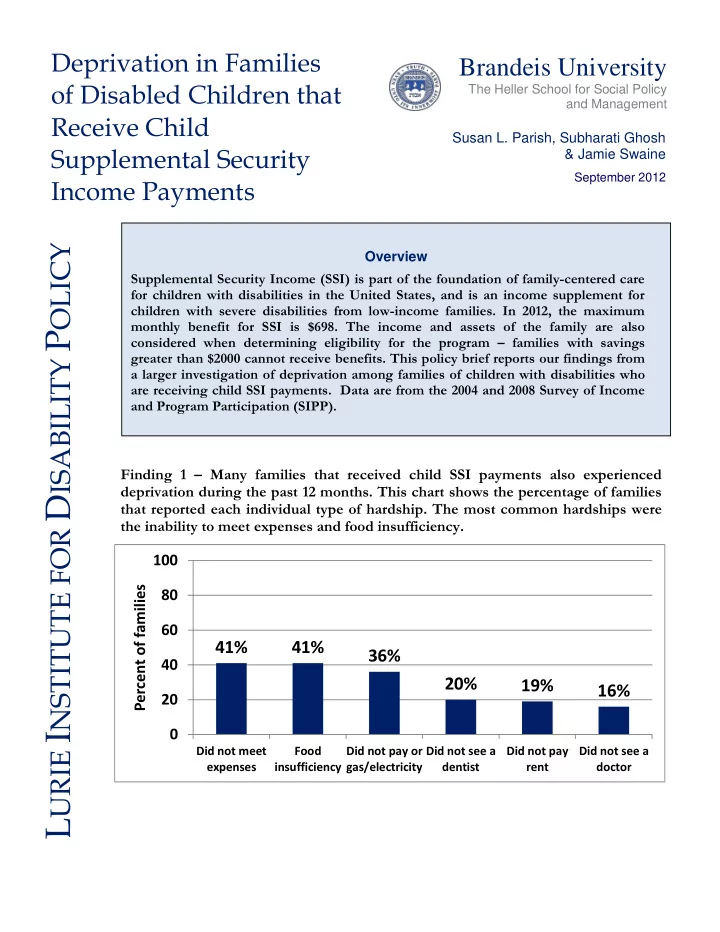

Deprivation in Families Brandeis University of Disabled Children that The Heller School for Social Policy and Management Receive Child Susan L. Parish, Subharati Ghosh Supplemental Security & Jamie Swaine September 2012 Income Payments L URIE I NSTITUTE FOR D ISABILITY P OLICY Overview Supplemental Security Income (SSI) is part of the foundation of family-centered care for children with disabilities in the United States, and is an income supplement for children with severe disabilities from low-income families. In 2012, the maximum monthly benefit for SSI is $698. The income and assets of the family are also considered when determining eligibility for the program – families with savings greater than $2000 cannot receive benefits. This policy brief reports our findings from a larger investigation of deprivation among families of children with disabilities who are receiving child SSI payments. Data are from the 2004 and 2008 Survey of Income and Program Participation (SIPP). Finding 1 – Many families that received child SSI payments also experienced deprivation during the past 12 months. This chart shows the percentage of families that reported each individual type of hardship. The most common hardships were the inability to meet expenses and food insufficiency. 100 Percent of families 80 60 41% 41% 36% 40 20% 19% 16% 20 0 Did not meet Food Did not pay or Did not see a Did not pay Did not see a expenses insufficiency gas/electricity dentist rent doctor
Finding 2 – 63% of families that received child SSI payments reported at least one material hardship in the previous 12 months. More than one-third of families experienced hardships in 3 or more domains (e.g., food insufficiency, inability to pay bills, unable to see a doctor when needed, unable to pay electricity). 100 L URIE I NSTITUTE FOR D ISABILITY P OLICY Percent of families 80 60 34% 40 16% 13% 20 0 1 hardship 2 hardships ≥3 hardships Finding 3 – The situation is worse for families with two or more disabled children. Among families receiving child SSI payments, 62% of families with 1 disabled child experienced at least one hardship in the previous 12 months. However, 74% of families with 2 or more disabled children experienced at least one hardship in the previous 12 months. This finding indicates that families do not benefit from economies of scale when they are raising two or more children with disabilities – quite the contrary; their likelihood of experiencing deprivation increases. 100 Percent of families 80 60 36% 37% 40 23% 14% 14% 12% 20 0 1 hardship 2 hardships ≥3 hardships 1 child with disability ≥2 children with disabilities
Finding 4 – Among low-income families (income below twice the federal poverty level or $38,180 for a family of 3 people in 2012), significantly more families receiving child SSI payments experienced hardship as compared to low-income families that did not have any children with disabilities. L URIE I NSTITUTE FOR D ISABILITY P OLICY 100 80 *p<.05; **p<.01; ***p<.001 67% Percent of families *** 51% 60 49% *** 38% 33% 40 *** 22% 20 0 ≥1 hardship ≥2 hardships ≥3 hardships SSI household No children with disabilities Summary Supplemental Security Income (SSI) is a pillar in the system of child-centered care in the United States, and SSI plays a vital role in the lives of families with children with severe disabilities. However, our findings indicate that the level of SSI benefits are wholly insufficient to prevent deprivation in these families. Material hardships are a common part of life for low- income families raising children with severe disabilities. The extent of these hardships is particularly troubling because these children are highly vulnerable, and likely to experience deleterious physical, emotional, academic, and social outcomes as a result of this poverty and deprivation. Authors & Acknowledgements Susan L. Parish, PhD, MSW, Lurie Institute for Disability Policy, Heller School for Social Policy and Management, Brandeis University; Subharati Ghosh, PhD, Lurie Institute for Disability Policy, Heller School for Social Policy and Management, Brandeis University; Jamie Swaine, MSW, School of Social Work, University of North Carolina at Chapel Hill. Support for this study and development of this brief was provided by the Lurie Institute for Disability Policy, the Heller School for Social Policy and Management, Brandeis University.
Recommend
More recommend